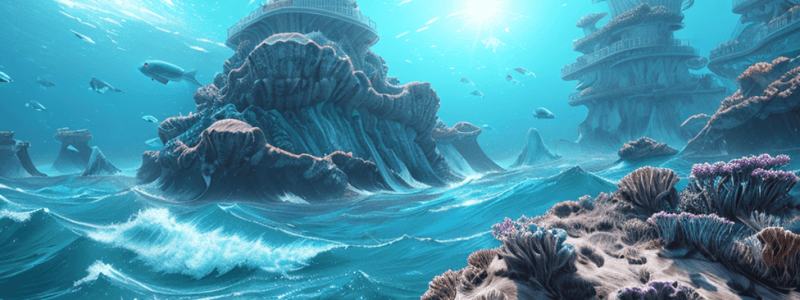Podcast
Questions and Answers
What does marine science cover?
What does marine science cover?
- Only the ocean and whales
- Only the ocean and coral reefs
- Only the ocean and its shores
- The ocean, its shores, and other bodies of water such as lakes and rivers (correct)
What percentage of the earth's surface is covered in water?
What percentage of the earth's surface is covered in water?
- Exactly 75 percent
- Over 80 percent
- Exactly 50 percent
- About 70 percent (correct)
What will you learn in this unit?
What will you learn in this unit?
- Only how the earth and its oceans were created
- How the earth and its oceans were created, plate tectonics movements, and the scientific method in marine science (correct)
- Only the scientific method in marine science
- Only plate tectonics movements
What is marine science also known as?
What is marine science also known as?
What does marine science study?
What does marine science study?
What is the percentage of water compared to land covering the globe?
What is the percentage of water compared to land covering the globe?
What is the rate at which Venice, Italy is sinking due to rising oceans and muddy land?
What is the rate at which Venice, Italy is sinking due to rising oceans and muddy land?
What causes ocean water to expand, thereby raising sea levels?
What causes ocean water to expand, thereby raising sea levels?
For how long have changes in sea level been at the current level?
For how long have changes in sea level been at the current level?
What is a hypothesis in the scientific method?
What is a hypothesis in the scientific method?
When are observations used in scientific inquiry?
When are observations used in scientific inquiry?
What happens to a hypothesis that can consistently be proven true?
What happens to a hypothesis that can consistently be proven true?
What did Alfred Wegener propose regarding the current continents?
What did Alfred Wegener propose regarding the current continents?
What causes seafloor spreading?
What causes seafloor spreading?
What type of boundary forms when plates move towards each other?
What type of boundary forms when plates move towards each other?
What drives the movement of tectonic plates?
What drives the movement of tectonic plates?
How do divergent boundaries contribute to the formation of bodies of water like the Red Sea?
How do divergent boundaries contribute to the formation of bodies of water like the Red Sea?
What determines the physical edges or boundaries of tectonic plates?
What determines the physical edges or boundaries of tectonic plates?
What type of boundary can result in one plate sliding above another, leading to the formation of ridges, mountain ranges, and underwater volcanoes?
What type of boundary can result in one plate sliding above another, leading to the formation of ridges, mountain ranges, and underwater volcanoes?
What is the most active volcano on Earth located on the Big Island of Hawaii?
What is the most active volcano on Earth located on the Big Island of Hawaii?
What contributes significantly to changes in sea levels?
What contributes significantly to changes in sea levels?
What type of boundary creates gaps on the ocean floor, leading to changes in sea levels as water fills the gaps?
What type of boundary creates gaps on the ocean floor, leading to changes in sea levels as water fills the gaps?
What type of plate movement can lead to underwater earthquakes, resulting in tsunamis that can devastate island nations?
What type of plate movement can lead to underwater earthquakes, resulting in tsunamis that can devastate island nations?
What do marine scientists study to understand the global impact of sea level changes on the environment?
What do marine scientists study to understand the global impact of sea level changes on the environment?
What percentage of Earth's water is found in the oceans?
What percentage of Earth's water is found in the oceans?
What accounts for less than 0.25% of Earth's weight?
What accounts for less than 0.25% of Earth's weight?
What is the temperature of the inner core of the Earth?
What is the temperature of the inner core of the Earth?
What is the composition of the outer core of the Earth?
What is the composition of the outer core of the Earth?
What causes earthquakes on the Earth's surface?
What causes earthquakes on the Earth's surface?
What fills the majority of freshwater on Earth?
What fills the majority of freshwater on Earth?
Flashcards are hidden until you start studying
Study Notes
The Ocean is a Vast Space
- An ocean is a large body of salt water that fills a large depression in the earth’s surface.
- Seas are technically also oceans, but the term sea is generally used to refer to smaller bodies of saltwater.
- The hydrosphere, the total mass of water on, under, or above the planet's surface, accounts for less than 0.25% of Earth's weight.
- 97% of Earth’s water is found in the oceans, with the majority of freshwater held in glaciers.
- Salt water makes up 97.5% of the world’s water, while freshwater makes up only 2.5%.
- The earth's surface is mostly water when seen from space.
- The earth's surface cooled, allowing rain to form the oceans, filling the lower points on the uneven surface.
- The Earth's crust is the thinnest layer, made of many uneven pieces called plates that float on the mantle.
- Plate movement on the mantle causes earthquakes, and the surface of the Earth is not stable.
- The outer core and inner core of the Earth have distinct physical and chemical properties.
- The outer core is in a liquid state due to high temperatures and is made of nickel and iron.
- The inner core is incredibly hot with temperatures of 9,000 degrees or higher, and has incredible pressure of 45 million pounds per square inch.
Studying That Suits You
Use AI to generate personalized quizzes and flashcards to suit your learning preferences.




